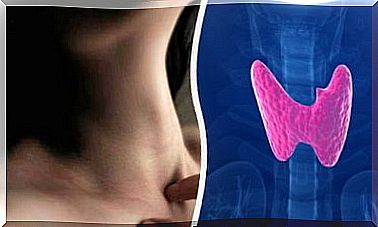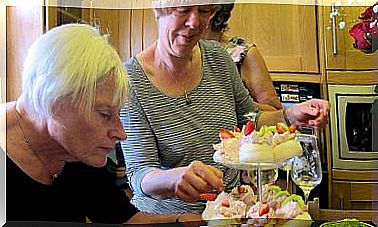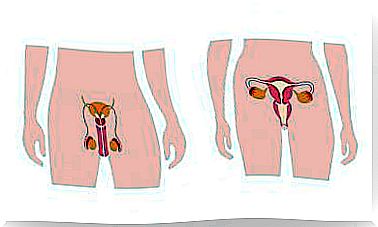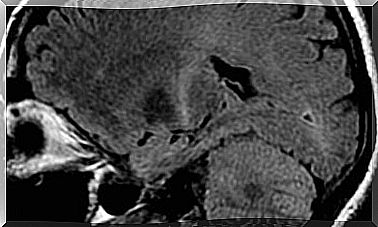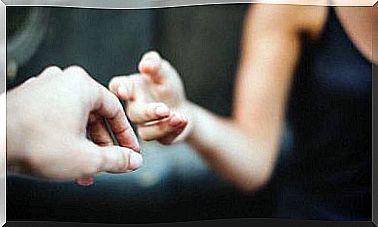How To Act When Our Nose Bleeds?
Contrary to what is often thought, when our nose bleeds, we should not throw our head back, but forward to expel the blood
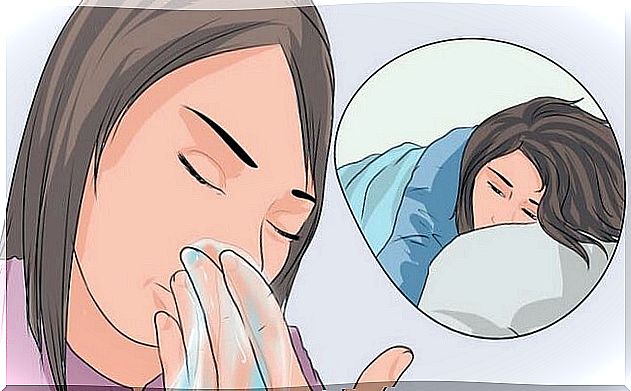
Epistaxis or nosebleeds can be due to many reasons. Although, in most cases, when our nose bleeds it stops after a few minutes without the intervention of a doctor or nurse, we must take into account certain practices so as not to lose too much blood.
In this article we tell you how to act when our nose bleeds.
Causes and types of nosebleeds
Inside the nose we find many small blood vessels that can be easily injured and cause bleeding. Thus, nosebleeds are more frequent in winter, since the entry of cold or dry air can irritate or dry the membranes that line the nose. Consequently, “scabs” can form which, when detached, bleed.
If we add to that the amount of viruses that “fly freely” through the atmosphere, the picture worsens.
In most cases the blood emanates from the tissue that separates both sides of the nose where the weakest blood vessels are and that are easily injured. However, when epistaxis occurs in the upper part of the septum, it is more difficult to control.
Nosebleeds are more common than we think, something unpleasant but mostly harmless for the body. There are two types of epistaxis :
- Previous, it occurs when blood flows only through one of the nostrils.
- Later, it occurs inside the nose or upper part of the septum. Blood falls into the mouth or throat.
There are different reasons why our nose bleeds. The most frequent are:
- Poke around with fingers
- Blowing hard
- Sneeze
- Take a hit
- Have an infection
We can also point to other triggers such as, for example, allergic rhinitis, nasal surgery, having a foreign body in the nose, inhaling very cold and dry air or chemical irritants.
On the other hand, people with high blood pressure or treated with anticoagulants and anti-inflammatories have a higher risk of bleeding.
How should I act if my nose bleeds?
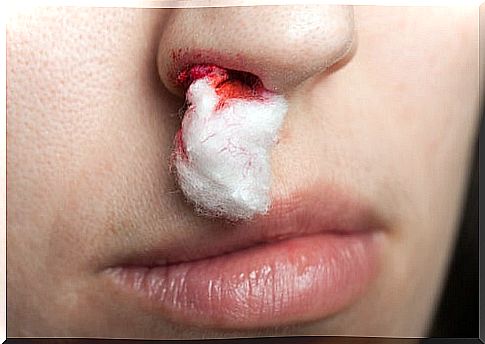
This is a very common question and, fortunately, there are different techniques that can help us if we have a nosebleed.
1. Make yourself as comfortable as possible
Body position is very important to reduce bleeding.
- This first aid technique consists of simply sitting on the sofa or in a chair with your back and neck as straight as possible.
- Tilt your head slightly forward and place a towel or tissue under your nose.
- Contrary to popular belief, lying down is a bad idea as the blood “draws back” and runs down the throat.
2. Compress the nose
If the bleeding is not abundant, you can lightly press the tip of the nose with your thumb and index finger.
- It completely blocks the nasal passages and puts pressure on damaged blood vessels.
- The blood flow will stop if you hold tight for about 10 minutes.
- If the bleeding continues, repeat the operation.
3. Cool off
- By reducing the body temperature, the blood will gradually stop emanating from the nostrils.
- You can, for example, place an ice cube in your mouth or even apply it to the sides of your nose.
- Some people choose to put a cold (wet) compress on the septum and apply light pressure.
- Another interesting idea is to have an ice cream or drink a very cold juice.
4. Wash the area
Cold water can be of great help when our nose bleeds.
- Without tilting your head too far toward the sink, wet the area well to avoid further bleeding.
- This technique (but with warm water) is also very good when the epistaxis has stopped and we want to clean the area.
5. Go to a medical center
This last step is only necessary if the bleeding does not stop after 20 minutes, if it has been caused by an accident or head trauma, or when we believe that the nose has been broken (for example, after a blow or an injury).
It is also important to go to the emergency room if we have a disease that can lead to nosebleeds or it is very abundant.
Can the nose be prevented from bleeding?
If you have suffered from nosebleeds in recent months (sporadically and not due to trauma or blow) or if you want to prevent this from happening, we recommend that you pay attention to the following tips:
1. Avoid picking your nose
Inserting your fingers into the nostrils can be normal for many people, however, this habit gradually damages the fragile blood vessels that are there.
This can also lead to the detachment of blood clots, the introduction of bacteria that worsen the pictures or wounds caused by the nails.
2. Eat more fibers

Although it seems strange, suffering from constipation can cause epistaxis due to the effort exerted when trying to defecate. This occurs because, the higher the pressure in the blood vessels, the more possibility of bleeding.
To avoid this, we advise you to eat foods rich in fiber and drink more water daily.
3. Have a humidifier
Bleeding can occur from inhaling very dry air. Using this type of device notably changes the humidity of the environment and prevents excessive dryness in the nose.
Feel free to put in a humidifier in the winter months. If you don’t have one, simply put a metal container filled with water on top of the radiator or heater.

